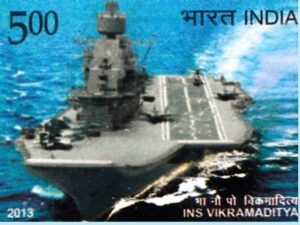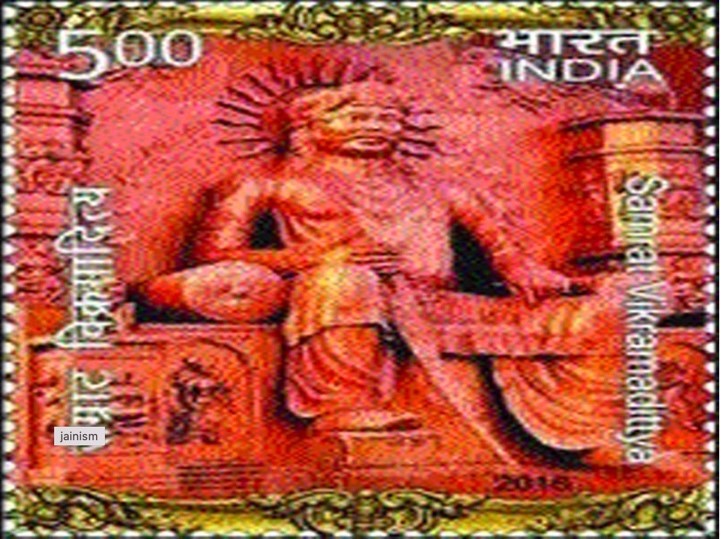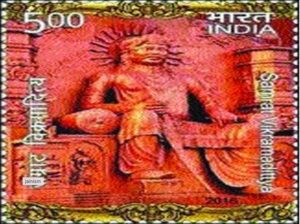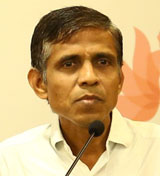In Indian historical eras, Vikram Samvat is a popular reference for time calculation. Valiant Emperor Vikramaditya of Bharat Varsha started the era of Vikram Samvat. Vikram Samvat era started 470 years after the Nirvana of Bhagwan Mahavir, and thus the Vikram era started in 57 BCE. Amongst the historical eras of India, we find Gregorian, Saka, and Vikram eras are frequently used. In Nepal, government records are stated using Vikram Samvat. Even the constitution of India, states its date of adoption as 26th November 1949 of Vikram Samvat. This is a lunar calendar. Time is calculated using lunar months and Nakshatra (lunar mansions). There are several reasons for the popularity as well as the wide acceptance of the Vikram Samvat era, among the several eras in usage in India. Emperor Vikramaditya’s dedication towards a fair and just rule, his generosity, and charitable work are some of the reasons why his era became so widely accepted and used in India. Historians, scholars, and literary authors have found Vikramaditya to be a Jain follower, based on various references. The magnanimity of Vikramditya’s personality and his huge generosity shows the influence of the Jain principles and values. He was a generous, religious, and tolerant Emperor. During the time of Emperor Vikramaditya, only Shraman and Brahmin sects were present in Bharatvarsha (India). Other cultures and religions arrived much later in India. From earlier times, Jain Dharma has been a part of the Shraman movement. Gautam Buddha, a contemporary of Bhagwan Mahavir, started Buddhism under the Shraman tradition. Buddha in the earlier periods of his search for truth, was a disciple of the followers of Bhagwan Parshwanath, and later started a separate Buddha sect.
In Jain Dharma, people from all four varnas (castes), have found due respect. Even women found respect, acceptance, and recognition in the four-fold sangha established by Bhagwan Mahavir. Equanimity of caste, equanimity of sex, science-based logical approach of Tattvagnan resulted in Jain Dharma being widely prevalent and followed by many. Jainism became the religion of the masses as well as of the kings and rulers. It is during such time, that Emperor Vikramaditya ruled.
Vikramaditya was indeed a valiant Emperor. The prefix “Vikram” in his name, indicates the courage and valour he possessed. The latter part of his name consists of “Aditya”, which means Sun, which is a metaphor for his famous and shining brilliant personality.
When foreign Saka rulers captured Ujjain (Avanti), young Vikramaditya did not have an organised army. To reclaim his ancestral kingdom from the Sakas at Ujjain, Vikramaditya enlisted the support of brave Malava soldiers and defeated the Sakas. To recognize the contribution of the Malavas, Vikramaditya renamed the kingdom of Avanti as a Malava kingdom.

At the age of 51, Vikramaditya created a Malava Samvat to commemorate his friendship with the Malavas. Because of the unparalleled generosity and charity of Vikramaditya, as well as his universal fame, the Malava Samvat came to be popularly known as Vikrama Samvat in the whole of Bharatvarsha. It is because of the great fame and honor that Emperor Vikramaditya was well known , that King Chandragupta II of the Gupta dynasty and later rulers chose to add the suffix Vikramaditya to their names. Hence, Chandragupta II is also knowns as Chandragupta Vikramaditya II.
Poets and authors from various traditions and sections of the community have been attracted to Emperor Vikramaditya’s bravery, good governance, multi-talented personality, an affinity for religion, and many other good characteristics of his personality. Over a hundred plus references are found for Emperor Vikramaditya in ancient Indian literature, written in Prakrit, Sanskrit. Meru Gurjar, and old Hindi. Quite a few of these were written by Jain monks and Jain scholars. Much work by Jain saints and scholars is indicative of Vikramaditya’s preference towards a fair and just rule in his kingdom as well as his leaning and acceptance of the Jain faith. Modern historians have also written many articles about Vikramaditya. Notable among the modern authors who wrote about Vikramaditya include historians Amarchand Nahata, Banarasidas Jain, Sagarmal Jain and Gujarati literary scholar Mohanlal Chunilal Dhami.
Ancient literature provides references to trustworthy relations and incidents of Jain Acharaya Kalak and Jain Acharya Siddhasen Divakar with Emperor Vikramaditya. Influenced by the teachings of Acharya Siddhasen Divakar (also known as Kumudchandra), Vikramaditya was motivated to ban the consumption of meat, liquor and killing of animals in his entire kingdom. Some Jain Pattavali provides references to Vikramaditya. However, some historians have doubted the existence and historicity of Vikramaditya. But Acharya Suhasti in the second part of the Jain Dharma ka Maulik Itihaas, has established the historicity and existence of Vikramaditya, citing thirteen references found in various stotras of Jain texts. Based on the multiple references found in Jain texts, Acharya Suhasti is of the view that Vikramaditya had not only in Bharatvarsha, but in other far and near neighbouring countries as well, had sent many goodwill gestures and undertaken charitable acts for the benefit of humankind.
In his old age, Vikramaditya took the refuge of Panch Parmeshthi (Arihant, Siddha, Acharya, Upadhyaya and Sadhu) and undertook Mahaprayan. Vikram Samvat initiator Emperor Vikramaditya, by his rule, became an immortal personality. He serves as a beacon and inspiration for even the present rulers and government. In December 2016, Indian Postal Service launched a five-rupee colour postage stamp, commemorating the iconic ruler Emperor Vikramaditya of Bharatvarsha.
Adapted and translated from original article in Hindi, which has been published in several publications.
Link to Hindi Article https://dainikjaltedeep.com/emperor-vikramaditya-and-jainism/



